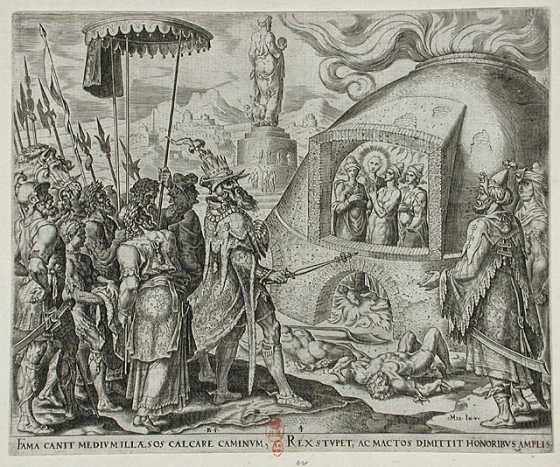
The story of the deliverance of Daniel’s three friends from persecution for their faith takes an unpleasant turn as a new form of religious oppression is set up as its immediate effect. Apparent victories are all too often co-opted by the vicious dynamics of the political systems that they appeared to have overcome. In Advent, however, we see a political rupture that can never be dissolved back into the prevailing power structures.

For three weeks now, I have been listening to Mary’s Magnificat sung as a part of the mid-week evening prayer service in my congregation. Last week, I leaned over to my five-year-old and told her, “This is the story of Jesus’ Mommy when she was pregnant with him.” Rereading a paper that I wrote on this text in college, I critiqued an over spiritualization of these words that are “a vivid proclamation of God’s eternal justice and intention to uplift the weak and lowly in a ministry of love…a call to social action on behalf of humanity.” Now, as I sit with the text, I can only say that it is all of this and more…

It is a challenge to reflect on politics and advent together. As advent emerges and we begin to anticipate the emergence of God’s presence into the world anew, as we expect the child who taught peace and preached liberation for the poor and oppressed, I cast my eyes on the political landscape and struggle to glimpse what might be breaking forth with new life. Perhaps this is a problem with how we conceptualize the birth of Jesus, as a grand cosmic event, an episode of a preordained salvation history, the inauguration of a new kingdom of peace on earth. There is another element to this extraordinary story, its ordinariness. Jesus is born in a Galilean backwater, to an unwed teen mother, lost in a crowd of travelers. Jeremiah prophesied to his ancient community about a time when justice and righteousness will emerge into history. We still await the fulfillment of this prophesy. But refracting this vision through the circumstances of Jesus’ birth will perhaps teach us to look for this hope in unexpected places…
Here we have one of the classic Advent themes associated with our preparations for the birth of Christ, but actually referring to John the Baptist as the forerunner of Jesus’ ministry 30 years later. I want to suggest an unorthodox and creative way of interpreting this text, one perhaps more in-keeping with the current context. We are inclined to ask ourselves “whose are the voices?” and “where is the wilderness?” I will reverse these questions in order to throw some light upon the nature of vocation and the reasons for the apparent frustrations of it.
It’s easy to read this week’s gospel as a warning of doom and gloom. It begins, after all, with this strict admonition, “Be Alert!” (v 23), and ends with the equally forceful command, “Keep awake!” (v 37). It’s as though Jesus has just shouted, “Watch out!” and thrown a ball of flaming fire into the crowd. But, of course, there is no fiery ball and so the question naturally is, “Watch out for what?” Within the pericope itself, the obvious answer becomes the awesome image that Jesus paints in verse 26: “The Son of Man coming in clouds with great power and glory.” And why should we be concerned? (Apart, of course, from the darkened moon and falling stars…) Because Jesus says the Son of Man is like a master returning and from there we write our own scripts of what wrath this master might bring. “Keep awake!” the Bible tells us, and we add, “Because if we sleep, we might be hit by that fiery ball!” And, indeed, for Matthew and Luke, who record this prediction as “a thief coming in the middle of the night,” rather than a master returning to his home, such fears may be warranted. But, for Mark, different dynamics are at play…
